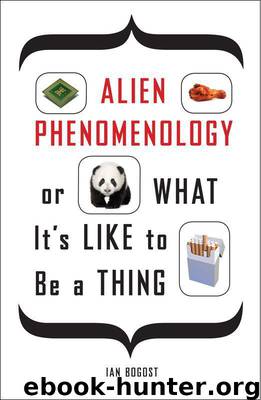Alien Phenomenology, or What It's Like to Be a Thing (Posthumanities) by Ian Bogost

Author:Ian Bogost
Language: eng
Format: mobi
Tags: Philosophy
Publisher: University Press of Minnesota
Published: 2012-04-02T17:00:00+00:00
[ 4 ]
Carpentry
Constructing Artifacts That Do Philosophy
As I drove home one sultry July afternoon, I listened to Tony Cox host an episode of National Public Radio’s Talk of the Nation. The segment was titled “Writers Reveal Why They Write,” a subject inspired by a Publishers Weekly series in which authors mused about their craft. “Writing,” Cox cooed slowly in his introduction, “is a process that can be very hard work. Today, we’re going to talk about writing and why we write.”[1] Two guests joined the program: the memoir author Ralph Eubanks (The House at the End of the Road) and the short-story writer Siobhan Fallon (You Know When the Men Are Gone). Not best-selling authors, but successful ones, and in any event writers who had managed to get featured on a national radio program. Wasting little time, Cox got right into it. “Why do you write?” he asked of Eubanks.
“Well,” began Eubanks, “I write because it’s something that’s really very satisfying for me. It’s very gratifying.” Quickly realizing that he’d never make it through the entire segment with milquetoast answers like this, Eubanks cited advice he’d received from the Washington Post journalist and National Book Award finalist Paul Hendrickson.
He said first, never forget that someone asked you to tell your story. My first book, Ever Is a Long Time and, to a certain extent, The House at the End of the Road are both in the memoir genre—so [I’m] feeling very fortunate to be able to tell my story. Not very many people get an opportunity to do that.
And the other thing that he told me is that when you write, you always want to capture the cruel radiance of what is (that’s a quote from Walker Evans). And he said every writer, every artist, wants to capture what is, not what you think it is but what it really is, which means you have to dig very deep into yourself and really pull out some things that are very difficult and sometimes very challenging for you.
And there’s something both emotionally satisfying about it and something that is very physically satisfying when you finally see your work when it comes out in a finished book or when you see the pages at the end of the day.[2]
These are genuine if somewhat callow remarks. Gratifying though emotional satisfaction may be, surely something more must drive successful writers to write? Things didn’t get much more specific when Fallon entered the conversation.
Well, all writers have that writers’ adage in the back of their mind: always about writing what you know. And when I was writing this collection [You Know When the Men Are Gone], I was writing about the world that I was living in, which I think is sort of a unique one, and it’s living on a military post and the world of or the military community. . . . I just felt like when people think military, they get this visual of an American soldier, and it’s easy to sort
Download
This site does not store any files on its server. We only index and link to content provided by other sites. Please contact the content providers to delete copyright contents if any and email us, we'll remove relevant links or contents immediately.
| Deconstruction | Existentialism |
| Humanism | Phenomenology |
| Pragmatism | Rationalism |
| Structuralism | Transcendentalism |
| Utilitarianism |
The remains of the day by Kazuo Ishiguro(8977)
Tools of Titans by Timothy Ferriss(8366)
Giovanni's Room by James Baldwin(7330)
The Black Swan by Nassim Nicholas Taleb(7109)
Inner Engineering: A Yogi's Guide to Joy by Sadhguru(6785)
The Way of Zen by Alan W. Watts(6601)
Asking the Right Questions: A Guide to Critical Thinking by M. Neil Browne & Stuart M. Keeley(5759)
The Power of Now: A Guide to Spiritual Enlightenment by Eckhart Tolle(5757)
The Six Wives Of Henry VIII (WOMEN IN HISTORY) by Fraser Antonia(5498)
Astrophysics for People in a Hurry by Neil DeGrasse Tyson(5182)
Housekeeping by Marilynne Robinson(4436)
12 Rules for Life by Jordan B. Peterson(4299)
Double Down (Diary of a Wimpy Kid Book 11) by Jeff Kinney(4261)
Ikigai by Héctor García & Francesc Miralles(4247)
The Ethical Slut by Janet W. Hardy(4242)
Skin in the Game by Nassim Nicholas Taleb(4239)
The Art of Happiness by The Dalai Lama(4125)
Skin in the Game: Hidden Asymmetries in Daily Life by Nassim Nicholas Taleb(3991)
Walking by Henry David Thoreau(3953)
